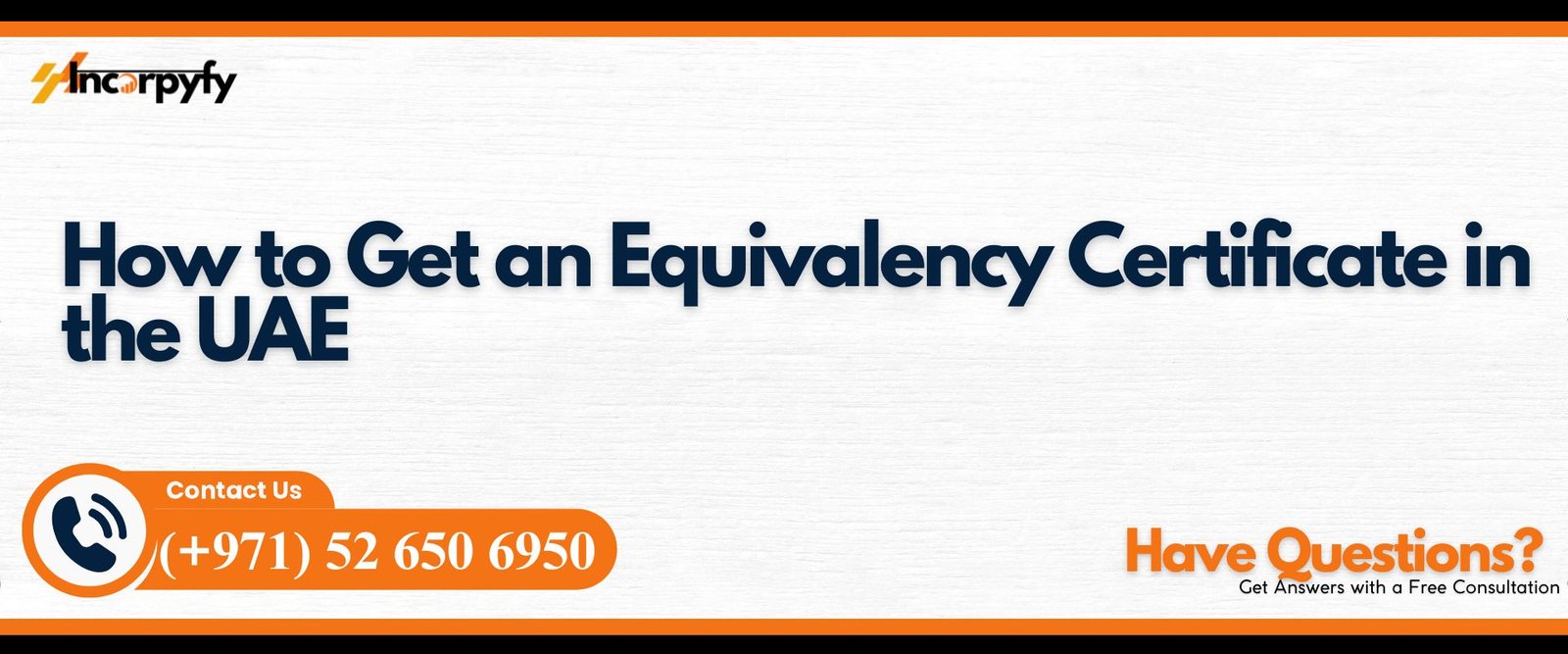
The Equivalency Certificate in the UAE is an essential document for professionals, students, and expatriates who have completed their education outside the country and wish to validate their foreign qualifications for official use. Whether you’re applying for a job, pursuing higher education, or setting up a professional license, obtaining an equivalency certificate ensures that your degree or diploma is officially recognized by the UAE Ministry of Education (MOE).
This comprehensive guide explains everything you need to know about how to apply for a degree equivalency certificate in the UAE, including the eligibility criteria, required documents, application steps, common challenges, and expert tips for a smooth process.
Understanding the Equivalency Certificate in the UAE
An Equivalency Certificate is an official document issued by the UAE Ministry of Education (MOE) that confirms your academic qualification—obtained outside the UAE—is equivalent to the standards of the UAE education system.
It verifies that the educational institution you attended and the program you completed meet the required academic standards. This equivalency is vital for employers, universities, and government departments to assess your eligibility for employment, licensing, or further studies.
Why an Equivalency Certificate Is Important
The UAE government and most organizations require an equivalency certificate to:
- Validate foreign degrees and diplomas for employment purposes.
- Apply for professional licenses (engineering, medical, education, etc.).
- Pursue postgraduate studies at UAE universities.
- Register a business or consultancy requiring specific educational credentials.
- Obtain immigration and residency permits for qualified professionals.
Without this document, your foreign qualification may not be officially recognized, which can delay or restrict your career or educational goals.
Who Needs an Equivalency Certificate in the UAE
Anyone with a foreign qualification who wishes to work, study, or apply for a professional license in the UAE must obtain an equivalency certificate.
For Job Seekers
If you hold a foreign degree and wish to work in the UAE, especially in regulated sectors such as education, healthcare, engineering, or law, you must submit an equivalency certificate as part of your employment documentation.
For Students
Students seeking admission to UAE universities for postgraduate or doctoral programs need to present an equivalency certificate to verify that their undergraduate degree meets the UAE’s academic standards.
For Professionals Applying for Licenses
Professionals applying for licenses from authorities such as the Dubai Health Authority (DHA), Knowledge and Human Development Authority (KHDA), or Ministry of Human Resources and Emiratisation (MOHRE) are required to present an equivalency certificate.
For Entrepreneurs
If your business activity requires technical qualifications—such as engineering consultancy, architectural design, or scientific research—you will also need an equivalency certificate to obtain a business or professional license.
Types of Equivalency Certificates in the UAE
The UAE issues equivalency certificates for high school, diploma, bachelor’s, master’s, and doctorate degrees, each validating foreign academic credentials within the UAE’s education system.
Secondary School Equivalency
This is required for students who have completed high school abroad and wish to enroll in universities in the UAE.
Diploma Equivalency
For holders of post-secondary diplomas (less than a bachelor’s degree) who need their qualifications recognized for work or further studies.
Bachelor’s Degree Equivalency
Required for professionals or graduates seeking job positions that demand a university degree in the UAE.
Master’s Degree Equivalency
Essential for individuals pursuing doctoral studies or senior roles where postgraduate qualifications are mandatory.
Doctorate (PhD) Equivalency
Mandatory for academic, research, and high-level consultancy positions in the UAE that require a PhD or equivalent qualification.
Step-by-Step Process to Get an Equivalency Certificate in the UAE
Obtaining your equivalency certificate involves several stages, from document attestation to final verification by the Ministry of Education.
Step 1: Ensure Your Institution Is Recognized
Before applying, confirm that your university or educational institution is accredited and recognized by the official education authority in the country of origin. The UAE MOE will only process equivalency for degrees issued by recognized institutions.
Step 2: Attestation of Educational Documents
All academic certificates must be attested in the country of issuance and in the UAE.
The standard attestation process includes:
- Verification by the issuing university.
- Authentication by the Ministry of Education (or equivalent authority) in the home country.
- Attestation by the Ministry of Foreign Affairs (MOFA) in the same country.
- Final attestation by the UAE Embassy or Consulate in that country.
After arriving in the UAE, the documents must be further attested by the UAE Ministry of Foreign Affairs (MOFAIC).
Step 3: Translation of Documents (if applicable)
If your documents are in a language other than Arabic or English, they must be translated by a legal translator accredited by the UAE Ministry of Justice.
Step 4: Create an Account on the MOE Portal
Visit the UAE Ministry of Education’s online portal and create an account using your Emirates ID or passport number.
Step 5: Upload the Required Documents
Scan and upload all required documents, including:
- Passport copy.
- Emirates ID (if available).
- Attested educational certificates.
- Academic transcripts.
- Accreditation proof of the institution.
- Thesis or research paper (for master’s and PhD degrees).
- Equivalency application form.
Step 6: Pay the Application Fees
The equivalency certificate fee varies based on the level of qualification and the document type. Payments are made online via the MOE portal.
Step 7: MOE Evaluation and Verification
The Ministry of Education will review and verify your submitted documents. This may involve contacting your university or requesting additional information for authenticity verification.
Step 8: Issuance of the Equivalency Certificate
Once approved, the equivalency certificate is issued digitally and can be downloaded or printed from the MOE portal. You will also receive an email confirmation.
Documents Required for the Equivalency Certificate in the UAE
The documents you must submit depend on your qualification level but generally include:
- Attested degree or diploma certificate.
- Transcript of records or mark sheets.
- Passport copy.
- Emirates ID copy (if available).
- Proof of university accreditation.
- Thesis or dissertation (for postgraduate programs).
- School certificate (for undergraduate equivalency).
- Equivalency application form from the MOE portal.
Timeframe to Obtain the Equivalency Certificate
The process typically takes 10 to 25 working days, depending on document completeness and verification time with the issuing institution. Delays can occur if documents are not properly attested or translated.
Cost of Getting an Equivalency Certificate in the UAE
The equivalency certificate cost in the UAE varies depending on the qualification and document type.
- High school equivalency: AED 150 – AED 300
- Bachelor’s/Master’s degree: AED 400 – AED 800
- Doctorate equivalency: AED 800 – AED 1,200
Additional fees may apply for attestation, courier services, or re-submission if documents are incomplete.
Key Authorities Involved in the Equivalency Process
The Ministry of Education, Ministry of Foreign Affairs, and UAE embassies collaborate to verify, attest, and officially approve academic certificates for equivalency recognition.
UAE Ministry of Education (MOE)
The main authority responsible for verifying academic credentials and issuing the equivalency certificate.
Ministry of Foreign Affairs and International Cooperation (MOFAIC)
Handles final attestation of foreign educational certificates before submission to the MOE.
UAE Embassy or Consulate Abroad
Attests documents in the home country to verify authenticity before they are recognized in the UAE.
Knowledge and Human Development Authority (KHDA)
For institutions operating in Dubai, KHDA may also be involved in verifying higher education credentials.
Common Reasons for Equivalency Rejection
- Unrecognized or unaccredited institution.
- Incomplete attestation process.
- Missing transcripts or supporting documents.
- Incorrect translation or notarization.
- Degree obtained through distance learning without approval.
- Mismatch between course and official study duration.
To avoid rejection, ensure that all steps are completed properly and the issuing university is fully accredited.
Benefits of Obtaining an Equivalency Certificate in the UAE
It validates your degree, enhances career opportunities, ensures eligibility for licenses, and allows enrollment in higher education institutions within the UAE.
Recognition of Your Foreign Degree
Your degree becomes officially recognized by the UAE government, enhancing your employability and credibility.
Eligibility for Professional Licensing
Professions like medicine, engineering, and teaching require equivalency certification to obtain a professional license.
Access to Higher Education
You can apply for master’s or doctoral programs at accredited UAE universities.
Easier Visa and Immigration Processing
Professionals with verified qualifications have smoother immigration approvals and visa sponsorships.
Better Career Opportunities
Employers prefer candidates whose qualifications are officially recognized by the UAE Ministry of Education.
Tips for a Smooth Equivalency Process
Prepare all required documents early, verify university accreditation, complete attestation accurately, and use certified translation services to avoid application delays or rejections.
Prepare Documents Early
Start the attestation and verification process before arriving in the UAE to avoid delays.
Verify Accreditation
Always confirm that your university is accredited and listed by the local education authority and recognized internationally.
Use Official Translation Services
Ensure all translations are completed by a certified translator approved by the UAE Ministry of Justice.
Double-Check Submissions
Incomplete or incorrect applications can lead to long delays or rejections. Review all uploads before submitting.
Seek Professional Help
If you find the process confusing, you can work with professional advisors who specialize in document attestation and equivalency services.
Understanding the Role of Attestation in the Equivalency Process
Attestation confirms that your educational certificates are authentic, legally recognized, and verified by both the issuing country’s authorities and the UAE government.
Why Attestation Is Mandatory
Attestation ensures that your educational certificates are genuine and recognized by the issuing country’s authorities and the UAE government. It is a form of legal verification that authenticates the document’s credibility.
Steps for Certificate Attestation
- Get your certificate verified by the university or college.
- Submit it to the Ministry of Education in your home country.
- Have it stamped by the Ministry of Foreign Affairs.
- Get final attestation from the UAE Embassy or Consulate.
- Once in the UAE, verify it through MOFAIC.
Without these steps, the Ministry of Education will not issue your equivalency certificate.
How Long Is the Equivalency Certificate Valid?
The equivalency certificate has no expiration date, as it permanently recognizes your educational qualification as equivalent to UAE standards. However, if you modify your educational status or acquire a new degree, you must apply again for equivalency of the new qualification.
Challenges in the Equivalency Process and How to Overcome Them
Common challenges include unaccredited institutions, missing documents, and translation errors. Careful preparation, early submission, and expert guidance ensure a smooth application process.
Unaccredited Institutions
If your institution isn’t officially accredited, equivalency will be rejected. You may need to provide additional verification or certifications from the local education ministry.
Incomplete Documentation
Many applicants face delays because of missing transcripts or improper attestation. Always maintain scanned copies and originals of every document.
Time Delays
Government processing may take longer due to verification with international institutions. Applying during non-peak months and ensuring complete paperwork can minimize delays.
Why Work with Experts for Equivalency and Attestation Services
Experts simplify complex procedures, handle documentation professionally, ensure full compliance, and expedite your equivalency certification approval through accurate submission and legal verification.
Simplified Process
Experienced consultants understand all legal requirements and handle paperwork on your behalf, ensuring faster approval.
Accurate Documentation
Professionals ensure every document meets MOE standards for attestation and translation.
End-to-End Guidance
Experts assist from initial attestation in your home country to final submission in the UAE, saving time and reducing errors.
Conclusion
Obtaining an equivalency certificate in the UAE is a vital step for anyone who has completed education abroad and wishes to live, work, or study in the Emirates. The process can seem complex, involving multiple authorities, attestations, and documentation — but once completed, it unlocks significant professional and academic opportunities.
Following each step carefully, ensuring proper attestation, and using certified translation services are crucial to a successful application. For smoother handling of all documentation and licensing procedures, it’s wise to work with experienced Business Setup Consultants in Dubai, UAE, who can guide you through the process seamlessly and ensure compliance with UAE regulations.
FAQs
What is an equivalency certificate in the UAE?
It is a document issued by the UAE Ministry of Education that verifies your foreign degree or qualification as equivalent to UAE academic standards.
Who needs an equivalency certificate?
Anyone who studied abroad and wants to work, study, or apply for a professional license in the UAE must obtain an equivalency certificate.
How long does it take to get an equivalency certificate?
Usually between 10 and 25 working days, depending on document completeness and verification time.
How much does it cost to apply for an equivalency certificate in the UAE?
The cost ranges between AED 300 and AED 1,200, depending on the qualification level and type of certificate.
Can I apply for an equivalency certificate online?
Yes, the application process is entirely online through the UAE Ministry of Education portal.
Can my degree be rejected for equivalency?
Yes, if your university is unaccredited, or if the program does not meet UAE educational standards, the application may be rejected.
Do distance-learning degrees qualify for equivalency?
Only if the distance-learning program is approved by the local education authority and recognized by the UAE MOE.
Is attestation required before applying for equivalency?
Yes, all foreign certificates must be attested by the relevant authorities and the UAE Embassy before applying.
Is the equivalency certificate permanent?
Yes, it has no expiration date and remains valid indefinitely for that qualification.
Can consultants help with the process?
Yes, professional consultants can handle attestation, translation, and application submission, ensuring a faster and error-free process.






